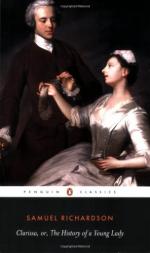* His forged letter. See Vol. V. Letter XXX.
I looked with indignation upon Mr. Lovelace, at this hint.
He seemed abashed. I have not patience, but to recollect the specious looks of this vile deceiver. But how was it possible, that even that florid countenance of his should enable him to command a blush at his pleasure? for blush he did, more than once: and the blush, on this occasion, was a deep-dyed crimson, unstrained for, and natural, as I thought—but he is so much of the actor, that he seems able to enter into any character; and his muscles and features appear entirely under obedience to his wicked will.*
* It is proper to observe, that there was a more natural reason than this that the Lady gives for Mr. Lovelace’s blushing. It was a blush of indignation, as he owned afterwards to his friend Belford, in conversation; for the pretended Lady Betty had mistaken her cue, in condemning the house; and he had much ado to recover the blunder; being obliged to follow her lead, and vary from his first design; which was to have the people of the house spoken well of, in order to induce her to return to it, were it but on pretence to direct her clothes to be carried to Hampstead.
The pretended lady went on, saying, she had taken upon herself to inquire after the people, on hearing that I had left the house in disgust; and though she heard not any thing much amiss, yet she heard enough to make her wonder that he could carry his spouse, a person of so much delicacy, to a house, that, if it had not a bad fame, had not a good one.
You must think, my dear, that I liked the pretended Lady Betty the better for this. I suppose it was designed that I should.
He was surprised, he said, that her Ladyship should hear a bad character of the people. It was what he had never before heard that they deserved. It was easy, indeed, to see, that they had not very great delicacy, though they were not indelicate. The nature of their livelihood, letting lodgings, and taking people to board, (and yet he had understood that they were nice in these particulars,) led them to aim at being free and obliging: and it was difficult, he said, for persons of cheerful dispositions, so to behave as to avoid censure: openness of heart and countenance in the sex (more was the pity) too often subjected good people, whose fortunes did not set them above the world, to uncharitable censure.
He wished, however, that her Ladyship would tell what she had heard: although now it signified but little, because he would never ask me to set foot within their doors again: and he begged she would not mince the matter.
Nay, no great matter, she said. But she had been informed, that there were more women-lodgers in the house than men: yet that their visiters were more men than women. And this had been hinted to her (perhaps by ill-wishers, she could not answer for that) in such a way, as if somewhat further were meant by it than was spoken.




